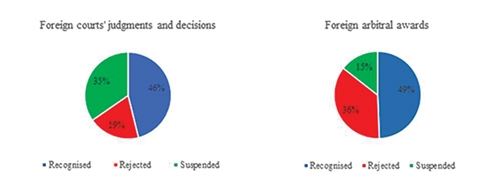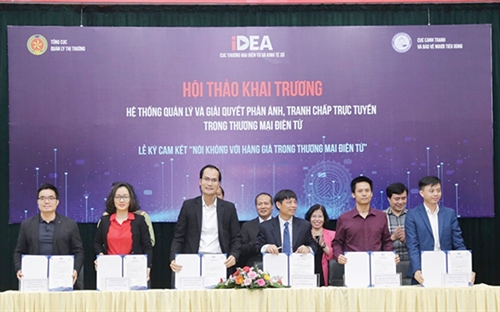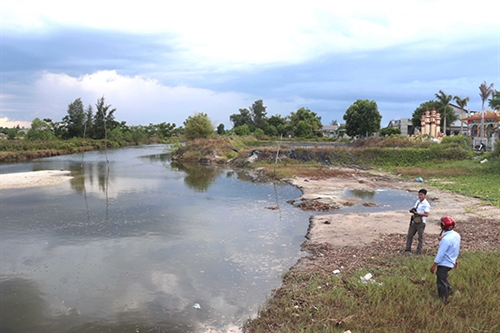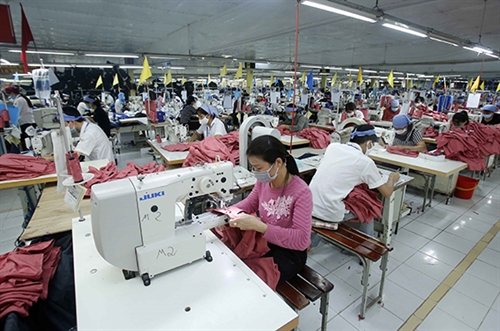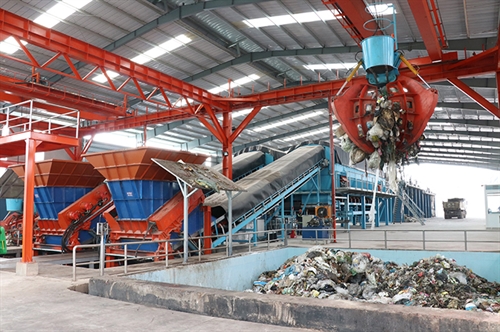Social security law constitutes a crucial factor contributing to the materialization of socio-political stability and sustainable development objectives. When manual labor is replaced by automation in the economy and robots replace men in various fields, millions of laborers in the world would find themselves unemployed, thus leading to a deeper social class division. Therefore, social security law should be reformed in conformity with such pillars as the Social Insurance Law, Health Insurance Law, Employment Law and Labor Code in order to assist laborers to be adaptable to Industrial Revolution 4.0.
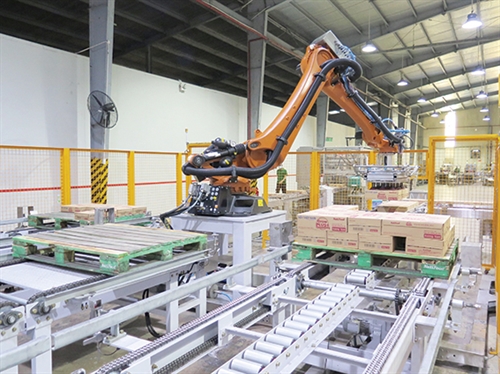 |
| Robotic cargo handling system of NutiFood Dairy Factory in My Phuoc I industrial park, Binh Duong province__Photo: Minh Hung/VNA |
Current status of social security law in Vietnam
Industrial Revolution 4.0, the inevitable trend of the time, is requiring the renewal of almost all aspects of social life, including social security law.
With the advent and vigorous development of this revolution, the income and living standard gap becomes much wider. Investment and measures that change the technological structure for survival and competition have increased the number of unemployed people. The poverty appearing together with the increasing prosperity has given rise to greater social assistance demands. Therefore, the State must use the social security law to regulate social relations toward assisting laborers to be adaptable to new requirements.
In Vietnam, the system of social security laws which consists of social insurance law, health insurance law, and employment and labor law has been incrementally improved to guarantee the people’s social security rights.
The 2013 Constitution has affirmed for the first time: “Citizens are guaranteed with social security” (Article 34); and “The State encourages and creates conditions for organizations and individuals to generate jobs for laborers. The State protects the legitimate rights and interests of employees and employers and creates conditions for building a progressive, harmonious and stable industrial relationship” (Article 57).
At the same time, the orientation on development of universal health insurance has been clearly spelled out in the Constitution: “The State and society shall invest in the development of people’s health care and protection, implement universal health insurance, adopt policies to prioritize healthcare for ethnic minority people, people living in mountainous areas, islanders and people living in areas with especially difficult socio-economic conditions” (Article 58) and “the State shall create equal opportunities for citizens to enjoy social welfare, develops a social security system and adopt policies to assist the elderly, the disabled, the poor and the disadvantaged” (Article 59).
Therefore, the social-security law serves as a tool for the implementation of social welfare policies. If the system of legal documents on social security is not available, the State cannot effectively settle social problems created by Industrial Revolution 4.0. Through the social security law, the State can regulate social relations and orientate and promote social development on the principle of sustainable development and fulfillment of social objectives.
In face of the impacts of Industrial Revolution 4.0, the development of the social insurance system, especially unemployment insurance, labor accident insurance, and occupational disease regime, larger involvement of non-state and poor laborers, and improvement of social insurance management and payment, constitute a fundamental content of the social security policy, aiming to promote the activeness and self-security capability of people against adverse economic impacts. The State’s policies on social insurance have demonstrated its support for laborers.
On June 29, 2006, the National Assembly promulgated the Law on Social Insurance. This is a legal document of the highest legal effect, institutionalizing the social security policy of the State and serving as a tool for the State to address the unemployment issue, an unavoidable trend of Industrial Revolution 4.0. The unemployment insurance allowances reflect the State’s concern for persons who are temporarily not adaptable to Industrial Revolution 4.0 and provide incentives for them to seek new jobs.
In 2014, the Social Insurance Law was revised with a broader coverage of compulsory social insurance. The Law enhanced measures against acts of evading the social insurance payment; improved the voluntary social insurance regime towards greater flexibility and suitability to the job and income conditions of laborers in the non-public sector; and introduced solutions to encourage non-public laborers to participate in social insurance with the State’s support and modernize management of social insurance participants.
Many remedies against acts of violating the social insurance law were clearly prescribed in the 2014 Social Insurance Law and the 2015 Penal Code (revised in 2017) from Article 214-216.
The Labor Code’s provisions on unemployment insurance have been further improved after various revisions. Especially, the 2019 Labor Code made a huge progress by broadening the subjects of application to sectors without industrial relations. Then on May 20, 2020, the Government issued Decree 61/2020/ND-CP, amending a number of articles of Decree 28/2015/ND-CP detailing the implementation of a number of articles of the Employment Law regarding the unemployment insurance.
The 2013 Employment Law has, for the first time, regulated the non-public economic sector, expanding the chance for laborers to participate in the unemployment insurance. The Health Insurance Law, which was promulgated on November 14, 2008, and revised in 2014, has shifted from the all-people coverage to household-based compulsory insurance; broadened the people’s participation in health insurance; and expanded the scope of subjects partially or fully protected by the State for participation in health insurance.
On December 14, 2016, the Government promulgated Decree 166/ND-CP, providing electronic transactions in the fields of social insurance, health insurance and unemployment insurance. It deals with registration for participation in electronic transactions; issue of social insurance books and health insurance cards; settlement of social insurance, health insurance and unemployment insurance regimes; assessment and payment of health insurance-covered medical examination and treatment expenses; and exchange of information on implementation of insurance regimes. The administrative reform for social insurance over the past 10 years has yielded positive results with the number of administrative procedures slashed from 263 to 27; the number of required files dropping by 32 percent, of declaration forms by 42 percent; the administrative procedure-processing duration reducing to 51 hours/year for enterprises.1 According to the World Bank’s assessment in its 2018 report on global business environment, Vietnam ranked 86/190 countries in tax and social insurance payment (up by 81 ranks as compared to the 2017 report, and ranked 4 among ASEAN countries after Singapore, Thailand and Malaysia)2.
The application of information technology has been accelerated in the social insurance sector with the building of national databases on social insurance books and health insurance cards; provision of on-line public services; connection of the health insurance examination system between social insurance agencies and medical examination and treatment establishments nationwide. The system of identification numbers of social insurance and medical insurance participants has been put into place on the basis of household database. The Vietnam Social Security has been ranked second among ministries, ministerial-level agencies and government-attached bodies in public services3 thanks to the effective application of information technology. Especially at the 35th Social Security Conference of ASEAN countries in September 2018, the Vietnam Social Security was awarded for “the accelerated administrative reform and higher effectiveness of services to people and enterprises” with its product “System of health insurance inspection information”4.
In recent years, the enforcement of the social security law has been crowned with encouraging results. The number of social insurance participants has constantly increased year after year. Through 25 years’ operation, the Vietnam Social Security has provided social-insurance benefits for over 115.5 million turns of people, including 2.5 million people having enjoyed the monthly social-insurance benefit; nearly 10 million turns of people given lump-sum allowances and more than 100 million turns of people provided with short-term allowances (illness, maternity, health rehabilitation allowances). After nearly 10 years of implementation of the unemployment insurance regime, nearly five million turns of laborers have been given unemployment allowances, more than 180,000 unemployed persons provided with vocational training; and over 1.39 million turns of people received job placement recommendations. In the health insurance field, from 2003 to 2018, the social insurance sector had coordinated with the health service in providing medical examination and treatment to more than 1,748.5 million turns of people5.
However, the social security law still reveals inadequacies such as unspecific guiding documents, which have been inconsistent with other legal documents, thus causing difficulties to the state management and law enforcement activities. Moreover, Industrial Resolution 4.0 requires the social security law to be further improved to better regulate social relations in the new situation. So far, there have been no specific provisions on the rights of medical examination and treatment establishments involved in electronic transactions in the social insurance sector. The remedies against acts of breaching the social-insurance law remain less specific and lack deterrent effect.
Solutions to improve social security law
First, to rectify inadequate provisions and add new ones in the social security law.
To continue revising the social insurance law towards covering all people. To establish a multi-layer social insurance system with appropriate provisions on social insurance payment and entitlement. To mete out heavier penalties against social insurance law violations. To prescribe the rights of medical examination and treatment establishments involved in electronic transactions in the social insurance sector (Clause 3, Article 16.3 of Decree 166/2016/ND-CP), with specific provisions on the duration for social insurance agencies to redress incidents in electronic transactions in order to ensure timeliness in the operation of medical examination and treatment establishments.
To revise the Employment Law towards guaranteeing the legitimate interests of employers and employees. The Law has prescribed such prohibited acts in labor as employment discrimination, physical abuse, infringement upon the honor, dignity, legitimate rights and interests of employees and employers, but failed to specify measures against violations. Therefore, specific administrative and criminal measures should be spelt out in the Law to deter those acts.
Second, to regularly review and assess the enforcement of the social security law with a view to amending improper provisions and adding new ones. Only by reviewing the reality of enforcement of the social-security law can loopholes be revealed and redressed.
Third, international experiences in the formulation of social-security law should be selectively learnt for application in Vietnam.
Industrial Revolution 4.0 requires synchronous solutions, including consultation of experiences of countries with socio-economic development level similar to Vietnam’s as well as countries with numerous achievements in the field of social security law, especially North European countries which have their human development indexes ranked top in the world6.
Though Vietnam’s economic development level is not on par with North European countries, we can study and apply what are suitable to our conditions such as the formulation of the social security law on the basis of principle of high universality: All citizens are guaranteed will basic social security interests and services, regardless of their incomes, employment or unemployment; the distribution of income is fairly equal, education is provided free of charge and equal opportunity to access employment is provided and the governments ensure jobs via positive policies on the labor market7.
With experiences of such countries, we can apply stricter measures against such offenses as late payment of social-insurance premiums, evasion of social-insurance payment, non-payment of wages by enterprises, self-seeking in the social insurance fund.-


